2012 election
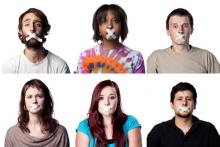
Young millennials — age 18 to 25 — are more comfortable with an evangelical than Mormon (or atheist or Muslim) president. This, according to part two of the Millennial Values Survey put out by the Public Religion Research Institute and Georgetown University’s Berkley Center.
Nearly six in 10 of those surveyed say they would be comfortable with an evangelical Christian serving as president, while 44 percent would be comfortable with a Mormon.
The numbers line up with those supporting President Barack Obama over Gov. Mitt Romeny at 55 percent to 39 percent — a spread that has actually increased 16 points since March.
But that won’t necessarily convert into votes. Nearly two-thirds of those surveyed are registered to vote, but only half report they are absolutely certain they will cast a vote in November.
The candidates’ religion isn’t the only factor affecting young peoples’ voting patterns. Another issue is a lack of voter engagement in the political process altogether.
“Millennials have a reputation for being the ‘wired’ generation, but when it comes to government, they’re unplugged,” said Daniel Cox, PRRI research director, in the news release Friday. “Across a range of measures, younger millennials indicated that they are disillusioned with the government’s ability to respond to their needs.”
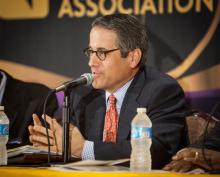
BETHESDA, Md. — With voters focused intently on pocketbook issues, both Mitt Romney and President Barack Obama are framing their faith-outreach efforts around the economy as the presidential campaign enters its final weeks.
That marks a shift from previous election cycles, campaign advisers say.
“That’s a major difference between this election and the last. The economy is the single issue that transcends every demographic, every coalition, every interest group,” said Mark DeMoss, an evangelical who has led Romney’s efforts to rally conservative Christians — a key Republican voting bloc — around the GOP nominee, who is a Mormon.
“Evangelicals are no less interested in the unemployment rate and the cost of living than non-evangelicals,” DeMoss added.
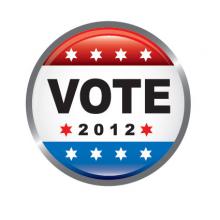
Editor's Note: This is the third article in Lisa Sharon Harper’s election season blog series, Watch the Vote. You can read the last article here.
With 28 days to go until our nation chooses its 45th president, a string of court victories have knocked down Jim-Crow-style barriers to voting that have been erected in states across the nation. But 13 states are still under the oppressive weight of laws designed to suppress the vote.
According to the Brennan Center for Justice, starting in early 2011, 41 states introduced legislation to restrict voting laws. Nineteen quietly passed 25 laws and two executive actions, some of which require government-issued photo IDs, proof of citizenship, fewer early-voting days, the elimination of Election Day voter registration, created barriers to voter registration drives, and created more obstacles for citizens with past criminal convictions.
The good news is that over the past few months we have seen one court case after another block the enactment of the worst provisions of these new Jim Crow laws. According to a recent Brennan Center study, 10 courts have blocked or blunted restrictive voting laws — and the Department of Justice blocked one more — since Oct. 3.
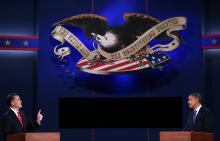
Last night millions of Americans watched the first Presidential debate of the 2012 election season. During the 90-minute debate, there were significant policy discussions about a range of issues, deep disagreements between the two candidates, and even a threat to Big Bird’s job security.
Yet despite all the arguing there was much left unsaid by President Barack Obama and Gov. Mitt Romney.
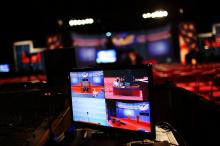
Editor's Note: Tweet @newshour to ask the candidates to #TalkPoverty in Wednesday's debate.
Marianne Williamson, a bestselling author and convener of the upcoming Sister Giant conference on women and politics, has called on President Obama and former Governor Mitt Romney to address “a meaningful array of topics” – including poverty, money in politics and incarceration rates in the U.S. – tonight during the first presidential debate.
Williamson talked to us earlier today about these issues, which are particularly pressing for Christians who take Matthew 25 seriously.
The interview was edited for length and content.
Q: What are you doing to get these issues out there?
A: Having a voice and creating your own platform is not all that difficult with today’s technology. I think what’s happening now is that, firstly, people are realizing that. Secondly, people are realizing that there are certain things that need to be said that simply are not being said as loudly as other things being said. When it comes to a politics of conscience, why wouldn’t we expect that during the debates there would be a conversation about the 23.1 percent of America’s children living in poverty, or the 34 percent of poor children, or the 46 million Americans living in poverty?
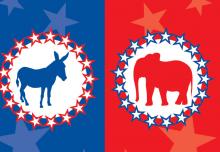
What if I told you that the political discourse in America has proven for decades what PSY’s ‘Gangnam Style’ phenomenon has proven recently? What do I mean? It is simply this: people can indeed get tirelessly excited about something that sounds good without understanding its contents.
Like every election year, 2012 seems to have its own particular set of buzzwords and slogans. From “the forgotten 47 percent” to “you did build that,” those on the left and the right are each trying to infuse the political discourse with their own partisan lingo. But it’s time somebody put a stop to the hype and asks the sensible question: “What is the real meaning behind all of this?”
Truth is, both political parties have been directing their resources to highlight their differences more than anything else. They are platforms defined by contrast, not by real facts. This should lead us to raise the question that is usually unasked (and therefore unanswered) amid the consistent heat of the American political climate: “If the government is designed ultimately for the good of the people, is the political discourse today reflective of that goal?”
To this question, the German philosopher Friedrich Nietzsche answers, “No.”

Tomorrow night is the first presidential debate. It will undoubtedly be an important moment in the campaign for the highest office in the land. But, whose lives will it be important to?
Certainly, there will be a lot for pundits to discuss and dissect. They will analyze phrases and statements, and will compare them to polling data and focus groups in swing states. Super PACs will record gaffes by either candidate, ready to turn them into multi-million dollar commercial buys.
But, as a person of faith, what I want to know is: how will the words that are said and the positions that are staked out affect the 46 million people in our country living in poverty? What does it mean for the hardworking families who can't put food on the table? Or the 1 in 5 children for whom poverty is an everyday reality and opportunity seems to be an illusion?
Tonight is the world premiere of a film that puts those questions front and center. The Line is a new documentary film from Emmy award-winning writer and producer, Linda Midgett. It tells the stories of real people struggling to make ends meet but still falling below the poverty line. These are stories far too common in our country today and should be a central topic of this debate.

I love food. I love food even more when it's shared with people. Some of my fondest memories with friends and family happened while sharing food. My husband and I shared our first date over a meal, and we got engaged over a meal. There's something about sitting around a table partaking in sustenance for our bodies that also fills our soul and our hearts. That's probably why I love communion so much.
So I was struck by Paul’s anger over food in 1 Corinthians 11. Granted, Paul comes off angry in other letters as well, but this one I decided to linger on for awhile because of verse 27: "Whoever, therefore, eats the bread or drinks the cup of the Lord in an unworthy manner will be answerable for the body and blood of the Lord."
Paul's letter is directed to a community in Corinth that was made up of the poor, the working class, and the rich. They lived together, shared communion with each other, and sought to be a community that reflected Christ. Now, this doesn’t seem too different from what we do at church today. But unlike how we celebrate communion — as it’s own “event” during service — for the 1st century Christians, communion was part of a real meal.
So what could be so "unworthy" about this shared meal?
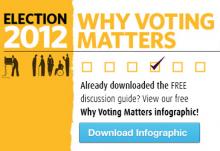
At its best, Christian faith provides a moral compass for advancing the common good. At worst, Christianity can be hijacked by partisan political agendas that divide and destroy. Sojourners encourages you to develop a robust and well-informed conscience around elections, measuring candidates and their platforms against Christian ethics and values. While we must be careful about translating scripture directly into public policy positions, there are principles and suggested approaches on a range of issues that can provide a critical framework to shape our perspective on public policy.
As we have since 2004, Sojourners has published an issues guide of principles and policies for Christian voters. We encourage you to use this guide to educate yourself on these issues. This can inform you as you write letters to candidates or to your local newspaper, call radio talk shows, and ask candidates at forums or town hall meetings questions based on these principles. Think and pray about whom, you would entrust with the responsibility to lead your community, state, and nation.
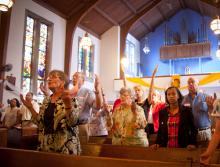
President Obama’s support among Catholic voters has surged since June, according to a new poll, despite a summer that included the Catholic bishops’ religious freedom campaign and the naming of Rep. Paul Ryan, a Catholic, as the GOP's vice-presidential candidate.
On June 17, Obama held a slight edge over Mitt Romney among Catholics (49-47 percent), according to the Pew Research Center. Since then, Obama has surged ahead, and now leads 54-39 percent, according to a Pew poll conducted on Sept. 16.
Among all registered voters, Obama leads Romney 51-42 percent, according to Pew.
Obama and Romney are essentially tied among white Catholics, which some pollsters call the ultimate swing group.
On Sept. 24 Romney unveiled his Catholics for Romney Coalition, which includes numerous politicians, beer magnate Pete Coors and Princeton University intellectual Robert P. George. The Obama campaign also has a Catholic coalition.

I was groomed in a Latino home where nail salons were viewed as rites of passage for becoming a senorita — growing young lady. Sometimes when I’m looking for some TLC, I head to my local nail salon in East Harlem. I could go to a more upscale salon, but here at Pretty Nail Salon, is where I want to be — connected to a neighborhood of ladies who have utilized storefront nail salons, beauty parlors, and hair-braiding places as makeshift therapeutic spaces where counsel and support is just as paramount to looking beautiful.
I have also discovered that nail salons are burgeoning places of policy concerns. Pretty Nail Salon has provided me with an informal education on how social policy affects the everyday day lives of working class folks. Our presidential candidates could also benefit from an appointment at Pretty Nail Salon, to listen to the local narratives and deepen their understanding of how social policy is affecting the lives of the urban poor and working class.
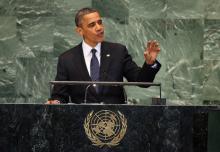
President Obama on Tuesday gave a forceful speech at the United Nations, in which he challenged much of the world's assumptions about free speech and religion.
Here are five points from his address, which together, add up to as close to an Obama Doctrine on Religion as we've seen:
1. Blasphemy must be tolerated, however intolerable
The idea that the U.S. protects even vile speech, so ingrained in American culture, seems counterintuitive to much of the world. It’s an especially tough concept when speech targets a religion, but Obama argued that restrictions on speech too often become weapons to suppress religion – especially the rights of religious minorities.
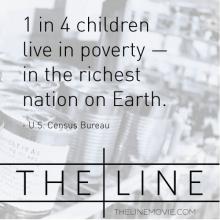
It’s annoying, isn’t it, how American political debate ignores the pressing issues and instead focuses on the trivial? I’m talking about pressing issues like the recently released poverty numbers – nearly 1 in 6 Americans lives in poverty, and the child poverty rate is even higher. That’s 46.2 million people living on less than $23,021 a year for a family of four.
Those are sobering numbers. Here’s another: a new study by Fairness and Accuracy in Reporting shows that of the 10,489 news stories on the campaign this year, just 17 of them addressed poverty in a substantive way. That’s a whopping 0.16 percent of coverage devoted to issues of poverty.
We need to get poverty back on the public agenda. In the richest country in the world, numbers that high should be seen as a moral crisis.

Editor's Note: This is the second article in Lisa Sharon Harper’s election season blog series, Watch the Vote. Read the first HERE.
A few folks got a brilliant idea and brought a bunch of organizations together to declare September 25, 2012 as the first ever National Voter Registration Day! Aka, for the Twitterverse, #925NVRD. Woot, woot!
Maybe, like me, you’ve moved since the last election. Or maybe you’ve just turned 18. Or maybe, somehow, you managed to sleep through the last two elections. Don’t know how you did it, and I’m not judging, but brother, son, sister, daughter, today is the day to get right with the Lord. In times like these no one can afford to sit back and watch this one like a reality show on Bravo TV. Exercise your dominion; register to vote today!
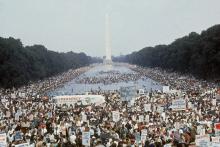
In early 1968, Martin Luther King, Jr., and other civil rights leaders continued plans for a Poor People’s Campaign. It would take place in the spring in Washington, D.C. The poor and those in solidarity with them would take up temporary residence and march peacefully on the Capitol and advocate for substantial anti-poverty legislation from Congress. They would demand jobs, healthcare, and decent housing.
People set up a camp on the Washington Mall and called it Resurrection City. Jesse Jackson gave his famous "I Am Somebody" speech there. But King was assassinated in the weeks leading up to the campaign and Robert Kennedy was assassinated during it. Disheartened and discouraged, people drifted away from the campaign, their dreams deferred.
What if MLK had lived to lead the campaign with his insight and eloquence? What if Bobby Kennedy had lived to support it with his doggedness and political will? Would the United States be a place where 1 out of 5 children, around 15.5 million, are in poverty and where close to 50 million people are without health insurance?

The white working class, a potentially rich bloc of voters for Republicans or Democrats, hasn’t settled on Mitt Romney or President Barack Obama, a new study from the Public Religion Research Institute shows.
“These white working class voters are not particularly enamored of either candidate,” said Daniel Cox, PRRI’s research director. “In terms of their favorability, they’re both under 50 percent.” Forty-four percent look favorably upon Obama and 45 percent upon Romney.
Released seven weeks before the election, the August survey found Romney with a double-digit lead over Obama among the white working class, which preferred the GOP candidate 48 to 35 percent.
But Cox points out that the gap narrows to statistical insignificance among women voters in this group, and in the Midwest and West, home of several swing states. The upshot for Romney and Obama?
If they want to woo this group, which makes up 36 percent of the nation according to the study, the campaigns may want to consider other findings of the PRRI poll.
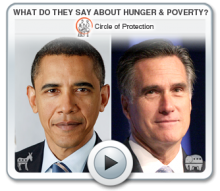
Christian leaders asked, and the presidential nominees answered. The poverty rate in America is still at a staggering 15 percent and 46.2 million Americans remain in poverty — what is your plan to address the problem?
The Circle of Protection, composed of Christian leaders from across the religious spectrum, released President Barack Obama's and GOP nominee Mitt Romney's video responses today at the National Press Club in Washington, D.C.
(VIDEOS from Obama and Romney after the jump.)
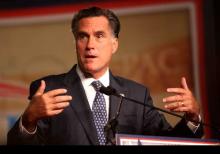
More than two dozen Christian conservatives are trying to put theological debates about presidential candidate Mitt Romney's Mormonism to rest by focusing on the policies outlined in the GOP's new national platform.
In a letter delivered Sept. 7 to Romney the leaders acknowledged that some conservatives have “tempered their enthusiasm for sound governing principles by their concern over differences in a candidate’s theological doctrine.”
But, the leaders said, "it is time to remind ourselves that civil government is not about a particular theology but rather about public policy."
Signatories of the letter include the two sons of the late Jerry Falwell, leading Catholic anti-abortion activist Rev. Frank Pavone, and GOP strategist Ralph Reed. Polls repeatedly show that, while most social conservatives favor Romney, nearly a quarter still express discomfort with his Mormon faith.
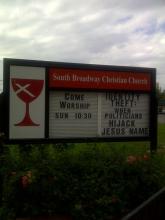
Gotta say I’m a big fan of this church sign at my father-in-law’s church.
It’s time to STOP:
- Using faith, Jesus, and the Bible as a political platform;
- Cherry-picking from the Gospel based on what polls well;
- Claiming Jesus would be so myopic to identify with either of our major political parties;
...
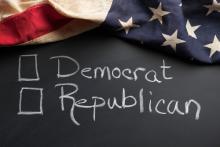
With the Republican and Democratic National Conventions having taken place over the last two weeks, we can officially say that we’re entering the election season (i.e., that time when the general public begins to pay attention).
A couple of friends who pastor churches in non-D.C. parts of the country asked me if we feel the need to address politics at The District Church, being in the very belly of the beast (my words, not theirs). Specifically, they were asking: Given the intense polarization and often-unproductive arguing that we see around us, even in the church, about the need to address how we interact with those who disagree with us.
So far, we haven’t needed to. In our church community, we have Republicans, Democrats, Independents, and yes, even people who don’t care about politics; we have Hill staffers, White House staffers, activists, advocates, lobbyists, policy wonks, and more — and we’ve all come together as the body of Christ, recognizing that our allegiance is first to Jesus before any party or even country.
Even so, every four years (or every two, if you pay attention to mid-terms; or all the time, if you’re even more politically engaged), posts about politics pop up with increasing frequency on social media, eliciting often-furious back-and-forths that usually end up doing nothing more than reminding each side how right they are and how stupid the other side is.
So I figured I’d try to offer a few suggestions on how we can engage with one another on matters of politics in healthy ways.